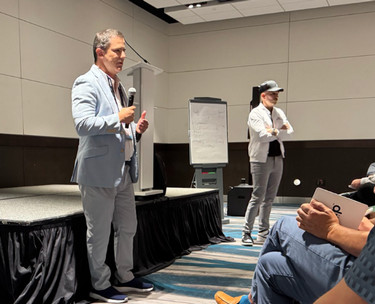During another XCamp session on Sunday, a series of talks was held in Breakout Room #4 with a focus on how to attract agents as well as retain them, plus an always-engaging talk on revenue share.
Positioning Yourself in a Competitive Market
Brian Copland and Aaron Novello kicked off an interactive breakout session on how to position yourself in a competitive market to attract agents organically, rather than through active recruitment.
They emphasized the importance of demonstrating how you can help others instead of merely telling them. “Don’t use social media for ego gratification,” they advised. “Instead, use it as a tool to guide and serve.”
Aaron further encouraged the group to share their expertise locally. “When you offer help freely, people begin to wonder how much more they could benefit by working closely with you,” he said. He emphasized that valuable skills can transcend geographic boundaries, making them truly borderless.
Brian’s Five Keys to Attracting Agents — “When you’re attracting, it always comes back to five basic things,” Brian emphasized.
- Surround Yourself with Top Agents: Being around top-performing agents helps you elevate your own skills and professionalism.
- Feature-Benefit Approach: Every feature should be paired with a benefit. For example, “We have nine different lead sources, which translates into more money in your pocket.”
- Cap Structure: The cap structure is designed to ensure agents keep more of their hard-earned money.
- Public Company: As a NASDAQ-listed company, agents have stock options.
- Revenue Share: Agents can build a leveraged income stream through revenue share, providing residual income.
Approaching Conversation and Attracting Through Deep Listening
Longtime eXp agent Elizabeth Riley, ranked as the No. 6 growth leader in the company, embodies the philosophy of “lifting others as I climb.”
“I’m like a little mother hen,” she said, reflecting on her previous company, where she felt drained trying to support agents without adequate backing. “People were joining, but the company wasn’t meeting their needs. So I helped them. And it drained my business and energy.”
When she joined eXp in 2015 as agent #466, Glenn Sanford told her, “I know what you’ve done over there. You’ll be great here.” Initially uninterested in revenue share, she has since “changed [her] tune,” becoming the #6 growth leader in the company and one of only two women in that role.
Elizabeth emphasizes using influence over ego and remains actively involved in real estate production to stay connected with the industry. Her approach is passive yet powerful, focusing on genuinely caring for her team and “loving on your people” to foster growth and loyalty.
“I am constantly inviting agents to events,” she shared, describing herself as a natural connector. From hosting happy hours to personal invites, she focuses on building relationships and fostering connections within the real estate community.
Riley uses tech tools to efficiently stay connected with her agents and clients, ensuring consistent outreach and support. “I leverage tools and apps to maintain strong relationships with my frontline so I can optimize my time and resources and so I can pour into them effectively.”
Mastering the Art of Deep Conversations
Ruben Garcia emphasized the importance of using the “needs analysis” for understanding and retaining agents. “If you’re writing this down, I was told a long time ago only the successful write things down,” he said, introducing a simple yet powerful four-step approach: goal, why, now, and gap.
He explained, “Ask them their goal, and more importantly, why it matters. Go three deep — ask the same question in different ways to uncover their true motivation.” This technique, according to Ruben, shifts the focus from surface-level answers to deeply personal goals, often tied to family or life-changing desires.
The final step in the process, the gap, requires agents to recognize the distance between where they are and where they want to be. “Logic makes you think, emotion makes you act,” Ruben noted, highlighting the emotional drive behind decision-making.
“This method isn’t just for recruiting — it’s a retention tool that can even be applied in negotiations and personal relationships.”
Building a Rev Share Business: A Side Hustle Approach
John kicked off the conversation by emphasizing the importance of treating revenue share as a side hustle.
“You’re not recruiting people to eXp, you’re helping them build a business,” he explained. He stressed the need to dedicate 30 minutes a day to lead generation and networking, which can make a significant impact.
John posed key questions to independent brokers: “How many agents do you have? Are you still in production? What percentage of production are you responsible for?” His solution was clear: “Run your brokerage on the eXp platform. Let eXp handle the training and support, so you can grow without geographical limits.”
Lars joined John on stage to offer his personal story. He recounted his transition from managing a large Century 21 office in Virginia to eXp after facing layoffs. “I had already prepared for this,” Lars recalled, likening his experience to the movie, “It’s a Wonderful Life” as his agents supported him through the change.
For Lars, success in agent attraction begins with making a clear decision. “You have to decide this is what you want for your business,” he said. Setting goals and growing a network are essential, and Lars pointed to the power of rev share, noting that “ten agents on your first level, 100 on your second — that’s $388,000 in revenue share.”
Both speakers emphasized the importance of relationship-building. Lars shared his approach using the FORD method (family, occupation, recreation, and dreams) to connect with agents, allowing them to feel understood before introducing eXp’s model. “I listen, align, and validate,” he explained, adding that eXp’s agent-owner structure and equity opportunities set it apart from traditional brokerages.
Together, John and Lars highlighted how eXp’s platform offers not just a business opportunity but a way to build deeper connections and empower agents to thrive.









